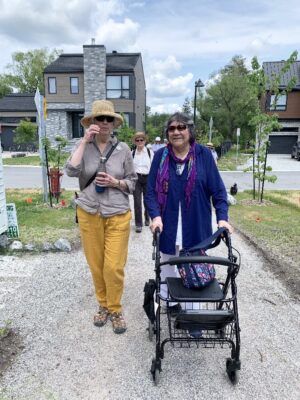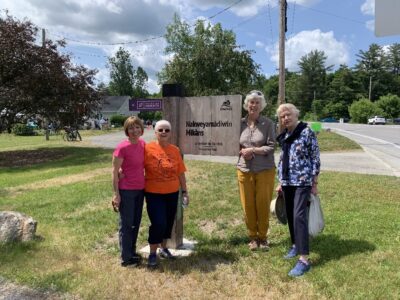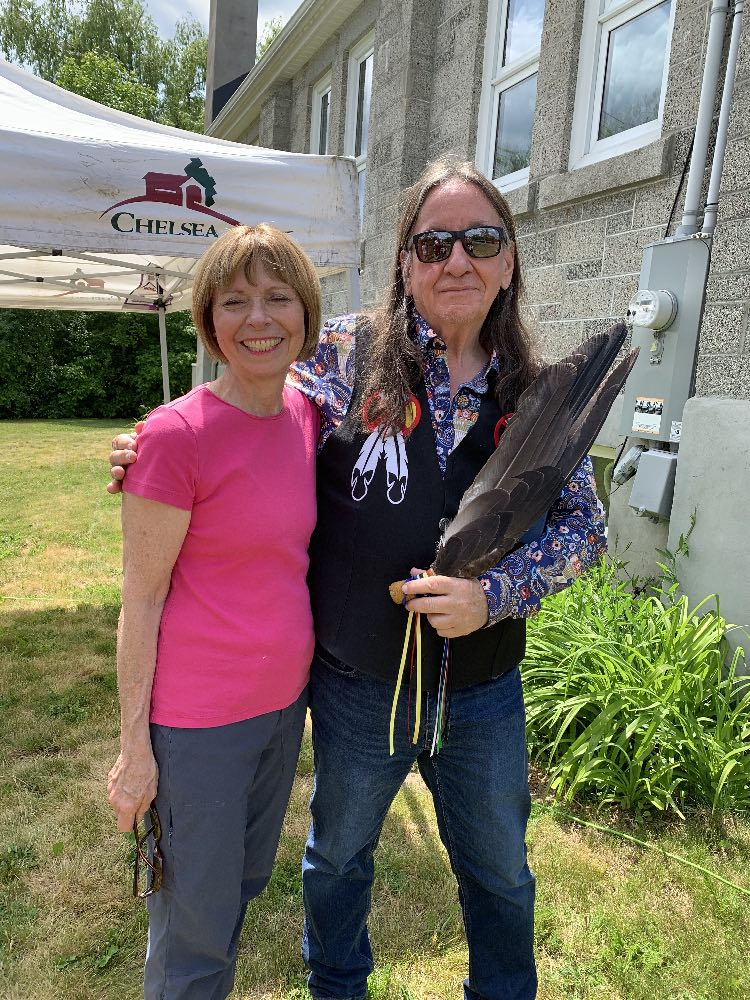A crowd of about 150 people gathered on unceded Algonquin territory in Chelsea, Que. at St. Mary Magdalene Anglican Church on a warm sunny day for the official opening and naming of a community trail. Named Nakweyamàdiwin Mikàns, which means friendship trail in Algonquin Anishinabeg, the trail was previously blessed by Bishop Shane Parker and Algonquin Elder and advisor to the bishop Albert Dumont, who suggested the name for the trail. But the June 10 event was the official civic opening attended by government officials, including MP for Pontiac Sophie Chatel and Chelsea councillor Rita Jain.
The opening of walk represented the culmination of many people’s efforts, including from the parish of St. Mary Magdalene, which donated land where the trail crosses the church grounds. The Rev. Canon Kevin Flynn welcomed all those gathered.
Chief Gilbert Whiteduck of Kitigan Zibi invited everyone to walk the trail reflecting on what they, as individuals, can do to make a difference, to contribute the journey of reconciliation.
Whiteduck said he reflected on the importance of the Gatineau River as he drove to Chelsea from Kitigan Zibi that morning. This region, where the three rivers —Gatineau, Rideau and Ottawa— meet has been home to the Algonquin people for millennia. Whiteduck, who is the first Indigenous president of the Gatineau Valley Historical Society, referred to artifacts recently found near Lac Philippe that have been dated at 10,000 years old.
The crowd then followed Whiteduck for a walk on the trail, which offers views of the Gatineau hills as it winds its way through a recently developed residential neighbourhood of Chelsea.
Many members of the diocesan All My Relations Circle mingled with other Anglicans, Unitarians and Chelsea residents who also came out for the event.
Marian McGrath, one of the key organizers and a member of St. Mary Magdalene parish, expressed her gratitude for a Healing and Reconciliation Fund grant, which allowed them to pay drummer Rene Racine. “He was terrific,” she said.
Whiteduck thanked those who walked. “When I see all of you taking your time on this Saturday to come out…my heart is overflowing…. You give me hope,” he said. “The Reverend rightly mentioned, [that we] cannot speak about reconciliation until you know the truth, the truth of this territory on which you live. As I was walking by, Rene and I were looking at those beautiful houses, and we were saying, “How come in our communities many of our families are living in houses that are falling apart? How come many don’t have potable water or good water? How come? What’s going on here? That gap is so large. Does anybody care? You care. You’re here for that.”
He compared work toward reconciliation to putting grains of sand on a path. “That pathway is a pathway of hope and change and reconciliation… We can’t go there with a truck. We have to bring our own grain of sand…. It’s not going to happen in our lifetime, but… I believe within two generations, we’re going to be a lot closer to it.”
All My Relations Circle member and St Thomas the Apostle parishioner Kathryn Fournier (Cree) reflected on his words. “Chief Whiteduck talked about how important it is for people, ordinary people, and not just politicians, to create change, even in small ways, in our own lives,” she said. “That is what will lead to right relations.”
Derwyn Sangster, also from St Thomas the Apostle, said, “I saw Chief Whiteduck’s point that we should be grateful to the land as an important fundamental belief – I think an Indigenous one — that is often overlooked by our society. The land, the Chief noted, provides everything we need to exist.”
Clockwise from top left: Walkers gather on the grounds of St. Mary Magdalene after exploring the trail; Marian McGrath and Chief Gilbert Whiteduck; AMR members McGrath, Marni Crossley, Debbie Grisdale and Gwynneth Evans with the sign for the trail; and Margaret Lemaire, Indigenous advisor to the bishop.





Saint Mary’s Church, Westmeath — Deanery of the Northwest